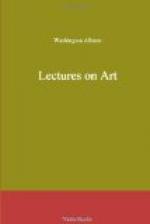It is still the unattainable, the ever-stimulating, yet ever-eluding, in the character of the sublime object, that gives to it both its term and its effect. And whence the conception of this mysterious character, but from its mysterious prototype, the Idea of the Infinite? Neither does it matter, as we have said, whether actual or supposed; for what the imagination cannot master will master the imagination. Take, for instance, but a single passion, and clothe it with this character; in the same instant it becomes sublime. So, too, with a single thought. In the Mosaic words so often quoted, “Let there be light, and there was light,” we have the sublime of thought, of mere naked thought; but what could more awe the mind with the power of God? Of like nature is the conjecture of Newton, when he imagined stars so distant from the sun that their coeval light has not yet reached us. Let us endeavour for one moment to conceive of this; does not the soul seem to dilate within us, and the body to shrink as to a grain of dust? “Woe is me! unclean, unclean!” said the holy Prophet, when the Infinite Holiness stood before him. Could a more terrible distance be measured, than by these fearful words, between God and man?
If it be objected to this view, that many cases occur, having the same conditions with those assumed in our general proposition, which are yet exclusively painful, unmitigated even by a transient moment of pleasure,—in Despair, for instance,—as who can limit it?—to this we reply, that no emotion having its sole, or circle of existence in the individual mind itself, can be to that mind other than a subject. A man in despair, or under any mode of extreme suffering of like nature, may, indeed, if all interfering sympathy have been removed by time or after-description, be to another a sublime object,—at least in one of those suggestive forms just noticed; but not to himself. The source of the sublime—as all along implied—is essentially ab extra. The human mind is not its centre, nor can it be realized except by a contemplative act.
Besides, as a mental pleasure,—indeed the highest known,—to be recognized as such, it must needs be accompanied by the same relative character by which is tested every other pleasure coming under that denomination; namely, by the entire absence of self, that is, by the same freedom from all personal consideration which has been shown to characterize the true effect of the Three leading Ideas already considered. But if to this also it be further objected, that in certain particular cases, as of personal danger,—from which the sublime emotion has often been experienced,—some personal consideration must necessarily be involved, as without a sense of security we could not enjoy it; we answer, that, if it be meant only that the mind should be in such a state as to enable us to receive an unembarrassed impression, it seems to us superfluous,—an




